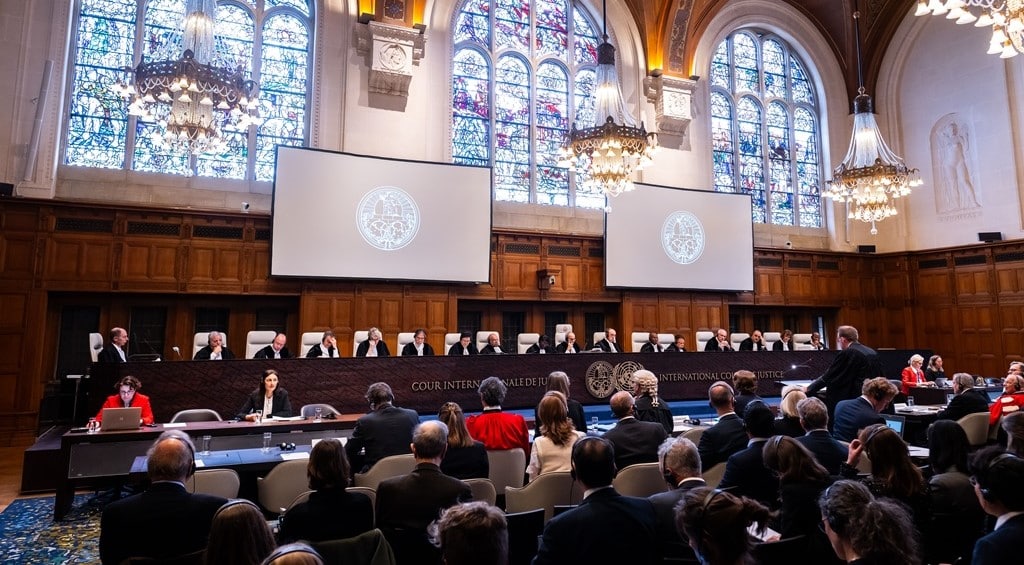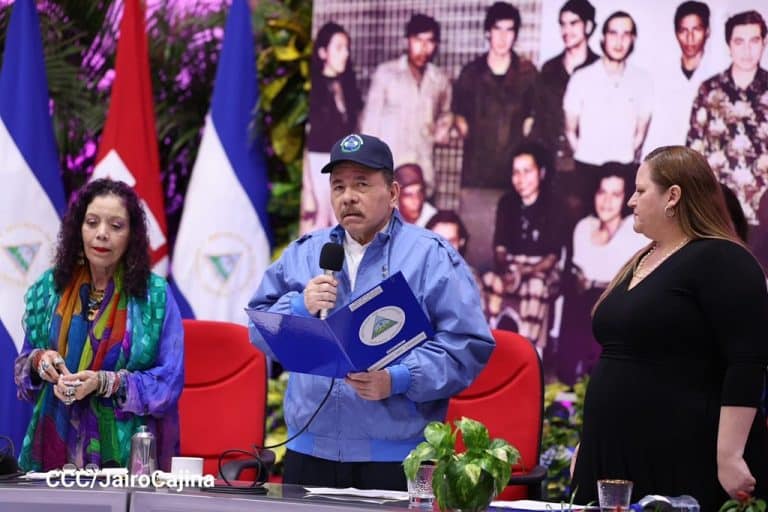28 de diciembre 2023

ICJ Rules Against Nicaragua's Request For Germany to Halt Arms Sales to Israel

PUBLICIDAD 1M
PUBLICIDAD 4D
PUBLICIDAD 5D
The dictator recalled the historic role of Hugo Torres, who died in February 2022 while a political prisoner of the regime.

Dictator Daniel Ortega speaks during an event on the night of Wednesday, December 27, 2023. Photo: Presidency
During a commemorative activity held on December 28, Daniel Ortega ordered his docile National Assembly to eliminate the existing “Ministry of Governance,” and rename it the “Interior Ministry,” as it was called in the 1980s.
“The step we’re taking today, of bringing the Interior Ministry back to life, gives us enormous strength. Once again, we count on those two great instruments with which we defeated the counterrevolution: the Army and the Interior Ministry,” Ortega stated.
“Logically,” he continued, “this strengthens the balance of power in the Ministry of the Interior, where the Police are unified, not separated; where the firefighters, colleagues working in the Penitentiary System, those in the Immigration Office, all together, are now are better equiped to fulfill tasks that prevent the enemy from advancing in their plans, because they’re always conspiring.”
The resurrection of MINT [former acronym for the Ministry of the Interior] has occurred via the passage of a new law: “the Law to establish the functions and structure of the Ministry of the Interior,” approved without discussion during a special session of the National Assembly on December 28th.
This legislation establishes the Ministry of the Interior as “the State organ responsible for implementing, maintaining, and executing the measures necessary to guarantee the security of citizens, the State, and the internal order of the national territory.”
Among its functions is: “preventing, neutralizing and ending any activity intended to destroy or undermine the constitutional and institutional order of the country, as established by the revolution.”
The new law was presented during an activity commemorating 49 years since the 1974 FSLN-led armed assault on the residence of “Chema” Castillo, then a Minister under dictator Anastasio Somoza. The action culminated in negotiations that freed Daniel Ortega, then in jail, together with a group of Sandinista prisoners.
“On this day, we’re commemorating one more year since the liberation of [myself and] the Sandinista prisoners, who had by then spent more than seven years in jail,” stated Ortega.
Ortega, who has been in power since 2007, recalled that the “commando group” that freed him was organized by the Sandinista National Liberation Front, then a guerrilla force under the direction of deceased comandante Tomas Borge.
The armed assault on the home of Jose Maria Castillo Quant took place on the night of December 27, 1974, when a guerrilla group attacked a party attended by members of Somoza’s cabinet. Castillo himself was killed the night of the attack, while the rest of the dignitaries were held hostage in demand of the release of the FSLN political prisoners, among them Ortega who had been arrested in 1967 for participating in a bank robbery.
When Ortega was released 49 years ago, he’d been in prison for seven years and one month. His now deceased mother, Lidia Saavedra, headed a committee for the liberation of the prisoners of that time.
Among those who liberated Ortega, now 78 years old, was the historic Sandinista combatant Hugo Torres, one of the most daring Sandinista guerrillas during the struggle against the Somoza dictatorship. He died in February 2022 as a political prisoner of the Ortega regime.
Torres became increasingly uncomfortable with the FSLN, and in 2007 joined the Sandinista Renovation Movement (MRS). He served as Vice President of the MRS, and for a time as its deputy in the Central American Parliament. Torres was a highly vocal critic of the Ortega regime following the 2018 mass protests and the regime’s violent repression. Early in 2021, he became vice President of the UNAMOS party, an outgrowth of the MRS. He was imprisoned in June 2021, part of a wave of imprisonment of opposition and civic leaders, and died in February the next year, while still in custody.
At the time of his imprisonment, Ortega referred to Torres as a “traitor” and the “Yankee imperialist’s son of a bitch.” Now, though, with Torres dead, Ortega called him a “compañero” and a “great combatant.” The ruler recalled that Torres served as Vice Minister of the Interior, in charge of State Security, following the 1979 triumph of the Sandinista revolution.
“Honor to those of the commando group who carried out a heroic operation. History can’t be denied in the face of the heroic occurrences, and those who participated in the commando indisputably demonstrated at that moment their commitment, their courage, on behalf of the Nicaragua people and the revolutionary struggle that the FSLN was waging,” the dictator declared.
*With information from EFE
This article was originally published in Spanish in Confidencial and translated by Havana Times.
PUBLICIDAD 3M
Confidencial es un diario digital nicaragüense, de formato multimedia, fundado por Carlos F. Chamorro en junio de 1996. Inició como un semanario impreso y hoy es un medio de referencia regional con información, análisis, entrevistas, perfiles, reportajes e investigaciones sobre Nicaragua, informando desde el exilio por la persecución política de la dictadura de Daniel Ortega y Rosario Murillo.
PUBLICIDAD 3D